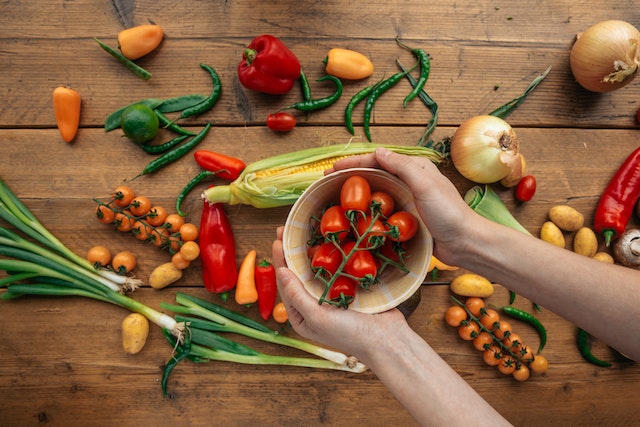
Are you looking for ways to delay the signs of aging and maintain a youthful appearance? If so, you’re not alone! As we grow older, we naturally start to see changes in our skin, hair, and overall health. But did you know that there are certain foods and supplements that can help slow down the effects of aging and improve our well-being?
In this article, we’ll look at the science behind anti-aging foods and supplements to see how they might help us attain a radiant, ageless look. There are several solutions available to help us achieve ageless beauty, ranging from antioxidant-rich fruits and vegetables to collagen supplements and probiotics. So, whether you want a simple diet change or a complete supplement regimen, we’ve got you covered.
Let’s embark on a journey of discovery and learn about the best ways to support our bodies as we age. The secret to a youthful appearance may be just a few bites or supplements away!
Anti-aging Foods
Antioxidant-rich foods
Eating a diet high in antioxidant-rich foods can help protect the body from oxidative stress and promote overall health and vitality.
Antioxidants in foods slow the aging process by neutralizing harmful molecules known as free radicals, which can cause cellular damage. This cellular damage can cause inflammation and a reduction in cellular function over time, contributing to the aging process.
Benefits:
Protection against sun damage. Antioxidants can help protect the skin from UV radiation and other environmental stressors.
Improved skin texture. By minimizing fine lines, wrinkles, and other symptoms of aging, antioxidants can help improve skin texture.
Reduced inflammation. Antioxidants can help reduce inflammation, which can contribute to a number of skin problems, including rosacea, eczema, and acne.
Improved hydration. Antioxidants can help improve hydration and maintain smooth, silky skin.
Promoted cell turnover. The ongoing process of removing old skin cells and then replacing them with newer ones is known as cell turnover. Antioxidants can help promote cell turnover, which can result in a brighter, more youthful appearance.
Examples: Tomatoes, spinach, blueberries, dark chocolate, almonds, leafy greens, and extra virgin olive oil.
Healthy fats
Healthy fats can help improve the health and appearance of the skin. They can improve hydration, reduce inflammation, and increase skin elasticity for a more radiant, young appearance.
Benefits:
Inflammation reduction. Inflammation is a contributing factor in many age-related diseases, such as cardiovascular disease, arthritis, and some forms of cancer.
Increased skin elasticity. Healthy fats, particularly omega-3 fatty acids, can help increase skin elasticity and reduce the appearance of fine lines and wrinkles.
Radiant skin. Healthy fats can help improve the health and appearance of the skin.
Maintained skin barrier function. Healthy fats are a crucial component of the skin’s barrier function, helping to protect the skin against damage and maintain its natural moisture levels.
Examples: Omega-3 fatty acids-rich foods, nuts, avocados, extra virgin olive oil, and eggs.
Vitamin C-rich foods
Vitamin C is a key component of a comprehensive anti-aging skincare regimen, and incorporating it into your routine can help you achieve a more youthful and radiant appearance. Eating vitamin C-rich foods, or using vitamin C-based skincare products can help improve skin health and reduce the signs of aging.
Benefits:
Collagen production. Vitamin C is required for the creation of collagen, which gives the skin structure and firmness. Collagen production declines as we age, resulting in fine lines and wrinkles. Vitamin C can assist increase collagen production and keep skin firm.
Brightening effect. Vitamin C has a brightening effect on the skin and can help to minimize the appearance of dark spots and hyperpigmentation.
Healing and repair. Vitamin C is involved in wound healing and skin restoration, making it an essential vitamin for keeping healthy skin.
Inflammation reduction. Vitamin C has anti-inflammatory properties that can help reduce skin redness and irritation, providing a more youthful appearance.
Antioxidant protection. Vitamin C is a powerful antioxidant that can help protect the skin against damage from free radicals, UV rays, and other environmental stressors.
Examples: Citrus fruits, kiwis, strawberries, tomatoes, and bell peppers.
Vitamin E-rich foods
Vitamin E is an important nutrient for maintaining healthy and youthful-looking skin and has several anti-aging benefits.
Benefits:
Hydration. Vitamin E helps maintain the skin’s natural moisture barrier, keeping it hydrated and preventing dryness.
Collagen production. Vitamin E plays a role in collagen production, which provides structure and firmness to the skin.
Antioxidant protection. Vitamin E acts as an antioxidant, protecting the skin against damage from free radicals.
Sun protection. Vitamin E can help protect the skin against damage from UV rays.
Examples: Almonds, sunflower seeds, avocado, spinach, mango, and kiwis.
Vitamin D-rich foods
Vitamin D plays a role in preventing aging. Getting enough vitamin D from natural sources, such as sunlight and diet, can help maintain healthy skin and decrease the effects of aging. Taking a Vitamin D pill might also help guarantee optimal consumption.
Benefits:
Immune system support. Vitamin D helps in the regulation of the immune system, which can help defend against sickness and lower the risk of chronic diseases that lead to aging. A healthy immune system can help fight off skin infections, prevent skin conditions like eczema, and maintain overall skin health.
Sun protection. Vitamin D helps regulate the skin’s production of melanin, which provides natural sun protection. Vitamin D also helps protect the skin against damage from UV rays, which can contribute to skin aging. Adequate Vitamin D intake can help reduce the risk of sunburns, age spots, and skin cancer, and promote overall skin health.
Mood regulation. Vitamin D is important for regulating mood and reducing symptoms of depression, which can help promote overall well-being and prevent the negative effects of stress on the body and skin. Stress can contribute to skin aging, so maintaining good mental health can help improve skin health and reduce the signs of aging.
Inflammation reduction. Vitamin D has anti-inflammatory properties that can help reduce inflammation throughout the body, including the skin. Inflammation can contribute to skin aging and the development of skin conditions like acne and psoriasis, so reducing inflammation can help improve skin health and reduce the signs of aging.
Examples: Salmon, mackerel, tuna, cod liver oil, red meat, and egg yolks.
Anti-aging Supplements
When it comes to anti-aging supplements, there are countless options available in the market that all make bold claims about helping to slow down the aging process. However, it’s important to note that it’s impossible to completely stop the aging process, but some supplements can help to support it.
Collagen peptides
Collagen peptides have been found to provide several skin advantages. They can aid in the reduction of wrinkles, the improvement of elasticity, the enhancement of moisture, and the prevention of acne. Collagen peptides can also aid in the protection of the skin from environmental damage and the reduction of inflammation. They can also help to enhance skin tone and minimize the appearance of scars, dark spots, and other imperfections. Collagen peptides can be ingested as a powder, blended into beverages and smoothies, or applied to the skin directly. The usage of collagen peptides regularly can assist in producing a healthy, young radiance.
L-theanine
L-theanine is a natural amino acid found in green tea, which has numerous benefits for the skin. Research shows that it has anti-inflammatory, antioxidant, and anti-allergic properties, making it extremely beneficial for a variety of skin conditions. It can reduce redness and swelling, improve skin texture, and boost collagen production. Additionally, L-theanine helps to reduce stress and improve sleep, both of which can have a positive effect on the skin. It can also help to protect against sun damage, making it a great choice for those looking to improve their skin health overall.
Zinc
Zinc is a mineral that has several skin advantages. It is used to treat skin conditions such as acne, eczema, psoriasis, sunburn, and wounds. It aids in the reduction of inflammation, the elimination of bacteria and fungi, and the promotion of healing. Zinc also protects the skin from UV damage and slows the aging process. It can also help to minimize the appearance of dark patches, stretch marks, and scars. Zinc can be used topically as a cream, ointment, or serum, or taken orally as a supplement. Many people find that using zinc can help improve their skin’s health, appearance, and feel.
Shilajit resin
Shilajit resin has long been known for its benefits to skin health. It has been used in Ayurvedic medicine for centuries. The primary benefit of shilajit resin to the skin is its antioxidant properties, which help protect the skin from free radical damage and oxidative stress. Shilajit resin is also said to be effective at reducing inflammation, improving collagen production, and boosting skin elasticity, making it a great choice for anti-aging. Additionally, its antiviral and antimicrobial properties make it a great addition to any skincare regimen, as it helps rid the skin of bacteria and viruses that can lead to skin irritation and infection. Finally, shilajit resin is said to be beneficial for healing wounds and restoring skin health, making it a great natural remedy for skin injuries or irritations.
Ashwagandha
The ancient Ayurvedic herb ashwagandha is known for its many health benefits, including its ability to improve skin health. Ashwagandha is a powerful antioxidant that can help protect skin cells from damage due to free radicals. It can also help with skin issues like eczema, psoriasis, and acne by reducing inflammation and irritation. Additionally, ashwagandha is believed to promote collagen production, which can help reduce wrinkles and keep skin looking youthful. Finally, ashwagandha has antimicrobial properties which can help reduce the risk of bacterial and fungal infections. All of these benefits make ashwagandha a great choice for those looking to improve their skin health.
Conclusion
There are several anti-aging foods and supplements that can help support our overall health and youthful appearance. Antioxidant-rich foods, such as blueberries, spinach, and dark chocolate, can help neutralize harmful free radicals and reduce inflammation. Healthy fats, like omega-3 fatty acids, can improve skin hydration, elasticity, and barrier function. Vitamin C-rich foods, such as citrus fruits and kiwis, can help increase collagen production and reduce signs of aging. Vitamin E-rich foods, like almonds and sunflower seeds, provide hydration and antioxidant protection. Vitamin D-rich foods and supplements can support the immune system and improve skin health.
Remember, while incorporating these foods and supplements can be helpful, it’s important to maintain a balanced diet, get enough sleep, and reduce stress levels to achieve optimal overall health and well-being. And, as always, it’s best to consult with your healthcare provider before making any significant changes to your diet or taking any new supplements.
